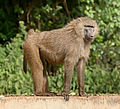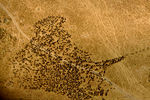Platyrrhini is a parvorder of primates. Members of this parvorder are called platyrrhines, or New World monkeys, and include marmosets, tamarins, and capuchin...
222 KB (8,699 words) - 07:52, 18 November 2024
New World monkey (redirect from Platyrrhines)
monkeys, their thumbs are not opposable (except for some cebids). List of platyrrhines List of primates by population Groves, C. P. (2005). "Infraorder Simiiformes"...
19 KB (2,061 words) - 14:09, 2 November 2024
Old World monkey (redirect from Monkeys of the Old World)
tails of Old World monkeys are not prehensile, unlike those of the New World monkeys (platyrrhines). The distinction of catarrhines from platyrrhines depends...
15 KB (1,617 words) - 13:44, 16 November 2024
catarrhines (Old World monkeys and apes, including humans), and the platyrrhines (New World monkeys). Haplorhini was proposed by Pocock in 1918 when he...
17 KB (1,889 words) - 17:38, 8 November 2024
of the family Cercopithecidae; Hominoidea, containing the great apes of the family Hominidae and the gibbons of the family Hylobatidae; Platyrrhines,...
409 KB (25,854 words) - 04:21, 19 August 2024
males and females possess three opsins classes. In nearly all species of platyrrhines (New World monkeys) males and homozygous females are dichromats, while...
31 KB (3,830 words) - 02:32, 8 September 2024
Jamaican monkey (category IUCN Red List extinct species)
formula of 2 incisors, 1 canine, 3 premolars and 2 molars – a departure from the vast majority of living platyrrhines (with the notable exception of the callitrichines)...
10 KB (1,114 words) - 11:32, 4 July 2024
The following is an alphabetical list of Greek and Latin roots, stems, and prefixes commonly used in the English language from P to Z. See also the lists...
2 KB (1,764 words) - 11:34, 28 October 2024
is considered plausible that P. brasilianum in platyrrhines is a result of the cross-species transfer of P. malariae brought to the New World by settlers...
5 KB (435 words) - 16:28, 15 April 2024
known as platyrrhine (flat-nosed) primates and are closely related to Old World apes and monkeys (catarrhine primates). Platyrrhines include some of the most...
30 KB (1,444 words) - 07:51, 18 November 2024
Primate (redirect from Life history of primates)
indicates a range of color vision similar to that found in platyrrhines. Like catarrhines, howler monkeys (a family of platyrrhines) show routine trichromatism...
161 KB (16,523 words) - 03:23, 21 November 2024
Monkey (redirect from List of monkeys)
groups of primates are referred to as "monkeys": New World monkeys (platyrrhines) from South and Central America and Old World monkeys (catarrhines in...
49 KB (4,538 words) - 08:11, 18 November 2024
Natural history Human history History of Earth Timeline of prehistory Timeline of the evolutionary history of life List of timelines Finarelli, John A.; Clyde...
88 KB (3,574 words) - 10:30, 19 November 2024
Patasola magdalenae (category Miocene primates of South America)
Hartwig, W.C.; Meldrum, D.J. (2002), The Primate Fossil Record - Miocene platyrrhines of the northern Neotropics, Cambridge University Press, pp. 175–188,...
8 KB (653 words) - 21:29, 3 July 2024
This is a list of the native wild mammal species recorded in Mexico. As of September 2014, there were 536 mammalian species or subspecies listed. Based on...
78 KB (6,478 words) - 00:56, 17 November 2024
Late Cenozoic Ice Age (category History of Antarctica)
(1999). "The origin of platyrrhines: An evaluation of the Antarctic scenario and the floating island model". American Journal of Physical Anthropology...
29 KB (2,962 words) - 10:56, 28 September 2024
Callitrichidae (category Primates of South America)
Callitrichinae, of the family Cebidae. This taxon was traditionally thought to be a primitive lineage, from which all the larger-bodied platyrrhines evolved....
14 KB (1,250 words) - 14:06, 2 November 2024
This is a list of the native wild mammal species recorded in South America. South America's terrestrial mammals fall into three distinct groups: "old-timers"...
157 KB (12,686 words) - 22:00, 20 November 2024
Pierre (2011), "Tail Architecture and Function of Cebupithecia sarmientoi, a Middle Miocene Platyrrhine from La Venta, Colombia", The Anatomical Record...
29 KB (1,101 words) - 00:54, 24 August 2023
living species—lemurs of Madagascar, lorises of Southeast Asia, galagos or "bush babies" of Africa, and the anthropoids: platyrrhine or New World monkeys...
22 KB (2,385 words) - 00:06, 30 October 2024
Red-bellied titi monkey (category IUCN Red List least concern species)
of a small, not especially prognathic face relative to other platyrrhines. The corpus of the mandible deepens posteriorly and the ramus is tall. The hyoid...
8 KB (1,156 words) - 17:54, 6 April 2024
Santarem marmoset (category IUCN Red List near threatened species)
1. Ford, S.M. (June 2005). "Evolution of sexual dimorphism in body weight in platyrrhines". American Journal of Primatology. 34 (2): 221–244. doi:10.1002/ajp...
6 KB (751 words) - 18:01, 6 April 2024
Nail (anatomy) (redirect from Growth of nails after death)
Rosenberger, A. (2011). "Morphological correlates of the grooming claw in distal phalanges of platyrrhines and other primates: A preliminary study". The Anatomical...
34 KB (4,212 words) - 08:57, 13 November 2024
Saimiri fieldsi (category Miocene primates of South America)
Hartwig, W.C.; Meldrum, D.J. (2002), The Primate Fossil Record - Miocene platyrrhines of the northern Neotropics, Cambridge University Press, pp. 175–188,...
10 KB (963 words) - 20:16, 3 July 2024
Mammal classification (redirect from Classification of mammals)
and apes Tarsiers (tarsiids) Anthropoid primates New World monkeys (platyrrhines) Callitrichids: marmosets and tamarins Cebids: capuchins and squirrel...
76 KB (6,393 words) - 18:36, 20 November 2024
Stirtonia (mammal) (category Miocene primates of South America)
Hartwig, W.C.; Meldrum, D.J. (2002), The Primate Fossil Record - Miocene platyrrhines of the northern Neotropics, Cambridge University Press, pp. 175–188,...
12 KB (1,100 words) - 09:02, 18 November 2024
Human evolution (redirect from Evolution of Homo sapiens)
the lemurs of Madagascar, lorises of Southeast Asia, galagos or "bush babies" of Africa, and to the anthropoids, which are the Platyrrhines or New World...
263 KB (26,339 words) - 16:16, 18 November 2024
Largest prehistoric animals (redirect from List of largest prehistoric carnivorans)
and body mass estimation in platyrrhines and catarrhines: Modern variation and application to fossil anthropoids". Journal of Human Evolution. 115: 20–35...
390 KB (40,740 words) - 09:05, 19 November 2024
Saimiri annectens (category Miocene primates of South America)
Hartwig, W.C.; Meldrum, D.J. (2002), The Primate Fossil Record - Miocene platyrrhines of the northern Neotropics, Cambridge University Press, pp. 175–188,...
10 KB (935 words) - 20:18, 3 July 2024
Lagonimico (category Miocene primates of South America)
Hartwig, W.C.; Meldrum, D.J. (2002), The Primate Fossil Record - Miocene platyrrhines of the northern Neotropics, Cambridge University Press, pp. 175–188,...
9 KB (912 words) - 18:33, 6 November 2024
















